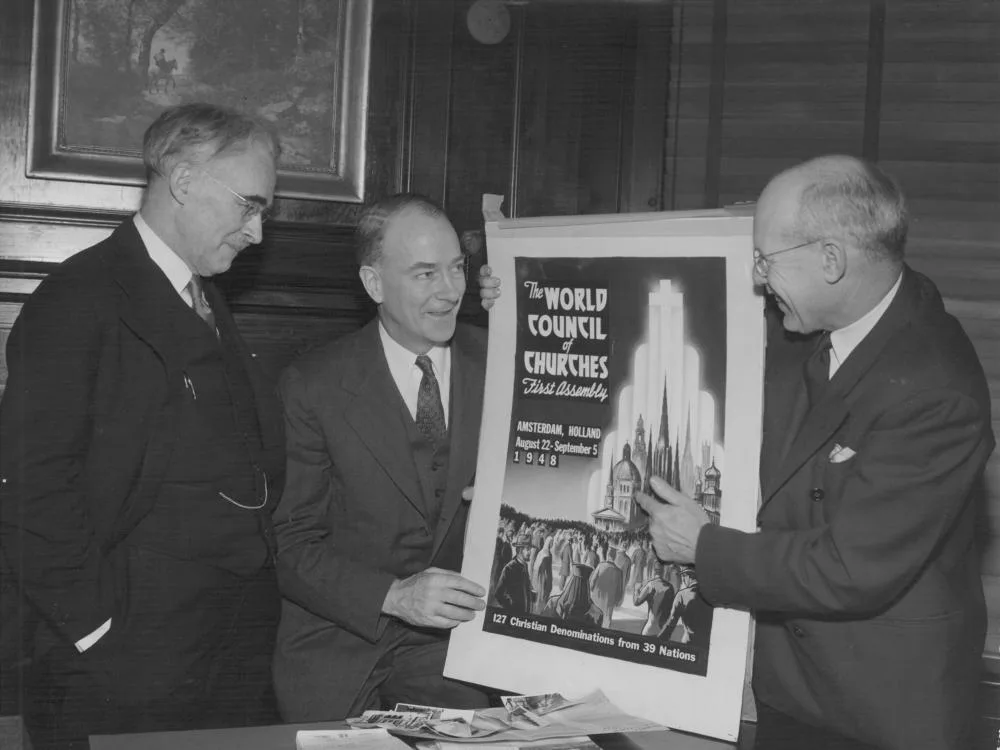In 1954 the World Council of Churches (WCC) held its general assembly in Evanston, Illinois. As a young college student recently called into the ministry, I had time at the end of the summer. My pastor told me that attending the assembly would be a once-in-a-lifetime experience. So I went. Not only that, I got a job in the cafeteria where many of the committees and subcommittees were meeting, so I got to listen in to the discussions while pouring coffee. I recall being impressed by Leslie Newbigen.
Themed “Christ, the Hope of the World,” a spirit of optimism, if not exuberance, characterized the assembly. There was the conviction that the ecumenical efforts of the World Council with its churches could Christianize the world. I observed that most of the discussion was done by white, English-speaking males. I also observed that my crowd, the evangelicals, were conspicuously absent.
Those were heady days for the ecumenical movement. The National Council of Churches (NCC) had in 1950 been formed from the former Federal Council of Churches. The NCC had copyrighted the highly regarded Revised Standard Version of the Bible (RSV). Church World Service, the relief arm of the NCC, was widely supported around the world.
Among the assumptions of the ecumenical movement in those days was that Protestant Christianity needed to be united to make an impact in the modern secular world. In 1948, Charles Clayton Morrison, editor of the influential Christian Century, wrote a book entitled, Can Protestantism Win America? Morrison claimed three forces were vying for the soul of America: Catholicism, Protestantism, and Secularism. Protestant chances rested upon its ability to overcome the sectarianism, denominationalism, localism, and individualism that beset it.
In 1962, ten major denominations – or, more correctly, the bureaucratic “leaders” of ten major denominations – came out with a bold proposal that seemed to be built on Morrison’s thesis: The Consultation on Church Union (COCU). What if the major Protestant denominations could work out their differences and unite to form a powerful church for good in the world?
The COCU was a bad idea for many reasons, presuming that doctrinal and polity differences did not matter. Even more troubling was a suspicion that what did matter for COCU was a fascination for a progressive agenda in areas of morality, economics, and social matters. The World Council (WCC) had already bought into the radical spirit of the 1960s. It was supporting revolutionary movements around the world, including some not adverse to violence. The ecumenical movement, which had grown out of the missionary conferences of the early 1900s, and which once spoke about winning the world for Christ, was now beginning to act like another political and social activist group. And in the process of acting just like another political and social activist group it divorced itself even further from the larger part of Christendom, namely: evangelicals, Pentecostals, para-church groups, Roman Catholics, and independent churches. For ecumenists these groups represented the forces that Morrison had criticized: sectarianism, localism, individualism, and, in doctrine, fundamentalism.
Good News, the only United Methodist evangelical renewal movement in existence at the time, saw this clearly. One of the very first issues Good News addressed, before missions, homosexuality, and the seminaries, was COCU. Evangelical United Methodists believed that COCU, if ever successful, would be a disaster. Criticism was directed toward Good News for being disruptive and denominationally disloyal, but in fact it was love for Methodism that precipitated the Good News actions. That which had made Methodism great – its doctrine and polity and mission – would be severely compromised if anything ever came of COCU.
Evangelicals had problems with Methodist liberalism, but nothing like the problems they would face if linked with the liberalism of the denominations United Methodists proposed uniting – or at least cooperating – with. For five General Conferences, Good News submitted petitions urging the church to withdraw from COCU. To no avail. The future was with ecumenism, according to our church bureaucrats, despite the signs that the whole movement was unraveling. COCU changed its name, in 1999, to Churches Uniting In Christ (CUIC), but the name mocked the reality. CUIC, like the ecumenical movement itself, was out of touch with where local churches were. Whether the WCC, NCC, CUIC, or state councils of churches, “ecumenical” groups narrowly focused on racism, sexism, feminism, ageism, handicapism, capitalism, militarism, and whatever other “-ism” was in vogue.
When I was a district superintendent in the 1980s in the UMC, the NCC issued the Inclusive Language Lectionary, which basically compromised Biblical language for feminist political correctness. Seven of the first nine charge conferences in my district that fall brought up the Lectionary, wondering, among other things, what was going on and was apportionment money supporting the NCC and feminist revisionism. Some of the other superintendents urged the complaining churches to get with the program. I reminded my churches that they weren’t using lectionaries of any kind – so why were they upset? However, I wrote on their behalf asking the NCC to get in touch with its constituents. The churches were also concerned about the Indiana Council of Churches for the same reasons. My counsel: forget the Indiana Council of Churches; it had no clout. Years later, the Indiana Council of Churches closed its doors for lack of money and interest.
At the 2000 UMC General Conference I made more impassioned speeches in the legislative group and on the floor of the conference than I had ever made at any General Conference, urging the church not to commit to the next big phase of CUIC. But disagreeing with anything ecumenical was politically incorrect. The General Conference affirmed the church’s commitment to CUIC and committed more resources and effort toward a supposed bright ecumenical future even when there were no signs of any future at all.
Soon afterward the Indiana Council of Churches tried to revive through a new group, Indiana Partners for Christian Unity and Mission (IPCUM). I was interested and became part of the board because the vision was right: inclusion of Catholics, evangelicals, and parachurch groups, plus the Nicene Creed as a basis for unity. I held on for six or seven years but then even I got discouraged. By this time ecumenical efforts of this type held no interest for evangelical or parachurch groups. At one state-wide rally celebrating our unity in Christ there were almost more on the program than there were worshippers in the congregation.
CUIC is even sicker today. State councils of churches are floundering. The National Council of Churches is seemingly locked in precipitous decline. At one time the NCC could claim that 40 percent of American church members were in denominations belonging to the council. Today, the NCC website claims the council represents 35 million Christians across 37 member communions. These numbers are highly inflated. Research groups find about 14 million Americans identify as mainline Christians today. One of the NCC’s greatest contributions to the churches, the Yearbook of American and Canadian Churches, is no longer printed.
So-called Call to Action legislation offered to the 2012 UM General Conference (seeking to reform and downsize UM’s bloated bureaucracy) failed spectacularly. However, the conference did do one good thing: it voted out of existence the UM General Commission on Christian Unity and Inter-Religious Concerns (GCCUIC), placing bishops in charge of ecumenical affairs.
The NCC mission statement is telling: “a community of communions called by Christ to visible unity and sent forth in the Spirit to promote God’s justice, peace, and healing of the world.” The statement says a lot: a focus on social and political action, but nothing about witnessing the saving power of Jesus Christ.
None of this is to suggest that real church unity and cooperation is dead. It is rather to lead to a point that much of the real Christian ecumenism these days is being carried on locally and by evangelical groups. In my community, Kokomo Urban Outreach, a UM-created ministry to the inner city, is supported by more than 100 churches and groups of every theological persuasion.
There is a place for agencies like the NCC and the WCC. Christians need each other and need an arena to find areas of common cause. But not under the old ecumenical corporate mind-set which lines up with progressives and alienates evangelicals and many others in the Christian world. I suggest if we want to do ecumenism on a national level we include some middle-of-the road or more conservative Christian groups interested in working together, like the Institute on Religion and Democracy. Progressive ecumenists talk about a big table and interfaith cooperation with Muslims, Hindus, and who knows who. They might better talk about including evangelical Christians and traditionalists.
Evangelicals in mainline denominations can help here. We live in both worlds, the evangelical and the mainline. We could help bring these worlds together if given the chance.
No comments yet





